OFF The Shelf #21 Inside the Lavender Tower: LGBT People in Academe
by Rob Ridinger
College and university campuses have long played a vital and varied role in the lives of LGBT people. They have served as the sites of research projects on community issues and histories, homes for the crystallizing discipline of LGBT studies, places where emerging activists learn the skills of networking and support, and locales for consciousness raising through classroom dialogues in courses across the curriculum. Post-Stonewall literature concerning LGBT people in higher education presents a mixture of print and online works that span several decades and appear in a variety of formats from research monographs to institutional reports and articles in both the LGBT press and professional journals. Subjects represented include student issues such as selecting a college or being a part of life on campus as an out individual, faculty issues such as debates over tenure cases or the validity of research on LGBT topics, the emergence of LGBT studies as a curriculum component leading to a certificate or degree and the formation of formally recognized LGBT studies programs and centers as part of the organizational landscape of American higher education.
The gay press has provided coverage of news from the academic world in varying degrees of detail. Between 1970 and 1982, The ADVOCATE carried stories on topics ranging from the founding of the Gay Academic Union (GAU) in 1973 to the nationally known employment discrimination case of Jack Baker and Mike McConnell against the University of Minnesota libraries and other less-known cases of faculty members obliged to fight for their positions and careers on grounds of either being gay or trying to teach about homosexuality. These stories provided community awareness of specific events and served to help gay and lesbian academics claim a voice in the movement and define relevant goals of their own. This was evident at the first conference hosted by the GAU in New York City in 1974, whose proceedings were published as The Universities and the Gay Experience : Proceedings of the Conference. The list of presenters and keynote speakers included women and men whose books and activism would come to define this aspect of LGBT studies across a wide range of disciplines, from historian John D’Emilio and Martin Duberman to Dr. Howard Brown, Barbara Gittings and Arnie Kantrowitz. Two of the topical sections addressed the issues of being lesbian or gay out in the academic world, “Scholarship and the Gay Experience” and “Coming Out in the Universities”. The Gay Academic Union remained based in New York City until 1978, when the organization moved to Los Angeles, from which it operated until being dissolved in 1984. During its years of existence it established local chapters in Chicago, New England, New York and Los Angeles, and published two periodicals , Gay Academic Union Journal : Gai Saber between 1977 and 1978,and the Gay Academic Union Newsletter beginning in 1978.
In book form, the first significant work to be published in the United States on LGBT people in the  collegiate environment was The Gay Academic, which appeared in 1978 and was edited by English professor Louie Crew. Its initial work included sending out a survey questionnaire to assess the state of LGBT faculty at individual institutions – a survey which was met with a range of responses from mockery and incomprehension to outright rejection. The text itself is divided into ten sections on general academic issues, history, library science (whose coverage was provided by the GLBT Round Table’s own Barbara GIttings in her now-famous essay “The Lies In The Libraries”), linguistics, literature (which covers general works, James Brogan’s article “Teaching Gay Literature in San Francisco”, English, French and German literatures), psychology, religion and theology, science, sociology and political science.
collegiate environment was The Gay Academic, which appeared in 1978 and was edited by English professor Louie Crew. Its initial work included sending out a survey questionnaire to assess the state of LGBT faculty at individual institutions – a survey which was met with a range of responses from mockery and incomprehension to outright rejection. The text itself is divided into ten sections on general academic issues, history, library science (whose coverage was provided by the GLBT Round Table’s own Barbara GIttings in her now-famous essay “The Lies In The Libraries”), linguistics, literature (which covers general works, James Brogan’s article “Teaching Gay Literature in San Francisco”, English, French and German literatures), psychology, religion and theology, science, sociology and political science.
On many campuses, LGBT issues were first made visible by the appointment of commissions or committees charged with assessing the current climate for this part of the student, faculty and staff population. Such committees were sometimes created as a result of incidents of harassment or homophobia. Reports of these commissions were sometimes listed in databases such as WORLDCAT or were otherwise obtainable online. Their texts collectively track the arc of growing awareness within the university and college diversity services sectors. An example of this genre is the 1989 publication from Rutgers, In Every Classroom : The Report of the President’s Select Committee for Lesbian and Gay Concerns.
With the emergence of the AIDS pandemic in 1981, the massive changes it wrought on the makeup and structure of North American gay and lesbian communities, and the fading of the GAU in 1984, considerations of LGBT academic lives and issues became less visible for much of the decade. A search run by the author in the ERIC database for the period 1978-1990 ( the interval between the publication of The Gay Academic and the beginning of the contemporary period of active publishing on LGBT life and issues on campus ) in the summer of 2017 yielded only forty-five items. An examination of those items reveal that most were either reports on the status of lesbian and gay issues at particular institutions, articles discussing how to incorporate LGBT materials into specific academic programs and disciplines, or the roles and relevancy of campus LGBT organizations. Paradoxically, the 1980s was also the decade that saw the birth of gay and lesbian studies as a distinct discipline with the foundation of the first department in the City College of San Francisco in 1988.
The 1990s opened with the appearance of another evaluative report, Creating Safety, Valuing Diversity: Lesbians and Gay Men in the University, written by the University of Oregon Task Force on Lesbian and Gay Concerns, issued in 1990. The following year saw the publication of an anthology 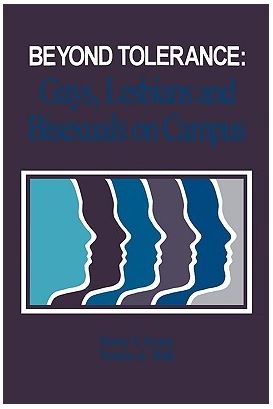 recalling The Gay Academic. Beyond Tolerance : Gays, Lesbians, and Bisexuals on Campus, edited by Nancy J. Evans and Vernon A. Wall, and published by the American College Personnel Association, approached LGBT university issues from the perspectives of counselors, student affairs staff, campus student leaders and the faculty. Topics addressed ranged from LGBT issues in sororities and fraternities, the needs of lesbian and gay students of color, being LGBT in the environment of a residence hall, working with student organizations, and ally training. A more direct successor to The Gay Academic appeared in 1992 – Gay and Lesbian Studies from Haworth Press, the book form of a themed issue of the Journal of Homosexuality. The ten papers in this collection traced the emergence of this area as a field of study, explored questions of terminology and problems of establishing a department in the new interdisciplinary field, as well as providing historical background on the status of gay and lesbian studies in the Netherlands and Canada. 1992 also saw the publication in East Lansing, Michigan of Moving Forward : Lesbians and Gay Men at Michigan State University by that institution’s University-Wide Task Force on Lesbian & Gay Issues. The concerns of faculty who claimed an LGBT identity also appeared in the 1993 anthology Building A Diverse Faculty edited by Joanne Gainen and Robert Boice from Jossey-Bass in the paper “Enhancing academic communities for lesbian, gay and bisexual faculty” by William G. Tierney and Robert A. Rhoads. An example of how LGBT historical research could be applied to a specific American academic institution , Anne McKay’s Wolf Girls at Vassar: Lesbian & Gay Experiences, 1930-1990 likewise appeared in 1993. And in Massachusetts, the Governor’s Commission on Gay and Lesbian Youth issued Making Colleges and Universities Safe for Gay and Lesbian Students: Report and Recommendations of the Governor’s Commission on Gay and Lesbian Youth.
recalling The Gay Academic. Beyond Tolerance : Gays, Lesbians, and Bisexuals on Campus, edited by Nancy J. Evans and Vernon A. Wall, and published by the American College Personnel Association, approached LGBT university issues from the perspectives of counselors, student affairs staff, campus student leaders and the faculty. Topics addressed ranged from LGBT issues in sororities and fraternities, the needs of lesbian and gay students of color, being LGBT in the environment of a residence hall, working with student organizations, and ally training. A more direct successor to The Gay Academic appeared in 1992 – Gay and Lesbian Studies from Haworth Press, the book form of a themed issue of the Journal of Homosexuality. The ten papers in this collection traced the emergence of this area as a field of study, explored questions of terminology and problems of establishing a department in the new interdisciplinary field, as well as providing historical background on the status of gay and lesbian studies in the Netherlands and Canada. 1992 also saw the publication in East Lansing, Michigan of Moving Forward : Lesbians and Gay Men at Michigan State University by that institution’s University-Wide Task Force on Lesbian & Gay Issues. The concerns of faculty who claimed an LGBT identity also appeared in the 1993 anthology Building A Diverse Faculty edited by Joanne Gainen and Robert Boice from Jossey-Bass in the paper “Enhancing academic communities for lesbian, gay and bisexual faculty” by William G. Tierney and Robert A. Rhoads. An example of how LGBT historical research could be applied to a specific American academic institution , Anne McKay’s Wolf Girls at Vassar: Lesbian & Gay Experiences, 1930-1990 likewise appeared in 1993. And in Massachusetts, the Governor’s Commission on Gay and Lesbian Youth issued Making Colleges and Universities Safe for Gay and Lesbian Students: Report and Recommendations of the Governor’s Commission on Gay and Lesbian Youth.
The anthology as a useful structure for presenting the range of debate on issues within higher education as it related to LGBT studies and identities continued with the 1994 publication by Routledge of Tilting the Tower : Lesbians, Teaching, Queer Subjects edited by Linda Garber. Its structure is unusual in that it first separates out discussion of classroom issues and opportunities for introducing lesbian topics into subject areas into two sections, college/university and high school. The final section of the book addresses how gay and lesbian studies can effectively integrate with and adapt to individual institutional situations. 1995 saw the publication by New York University Press of the first of what would come to be a distinct genre within the literature of LGBT higher education, guidebooks designed to help LGBT students select a campus where their identities could be affirmed rather than hidden as had traditionally often been necessary. The Gay, Lesbian, and Bisexual Students’ Guide to Colleges, Universities, and Graduate Schools by Jan-Mitchell Sherrill and Craig Hardesty was based a upon an undated survey of 179 institutions provided by the National Gay and Lesbian Task Force from its list of mailing labels. This resulted in colleges and universities which were actively involved with LGBT studies , rights and campus life being omitted. Each entry is composed of a brief essay about the school accompanied by students’ opinions on specific issues and topics such as the presence or absence of inclusive courses, homophobia, student organizations and safe-sex education. The final item is a statement as to whether the survey respondents would recommend the institution to LGBT applicants. The inclusion of the full text of the questionnaire used is a valuable part of the historical record, but the lack of information on how many people responded from each institution makes comparison of the data difficult.
An exploration of the impact of the gay rights movement on the academic community formed the body of a master’s thesis accepted at Michigan State in 1995. In this thesis, Historical Perspectives on the Midwestern Gay and Lesbian Academic Community : Stonewall and the Ivory Tower, Albin Rose brought the issue home through the use of interview data from six individuals who had been involved with Michigan’s higher education system during the period when gay liberation was a new and exciting 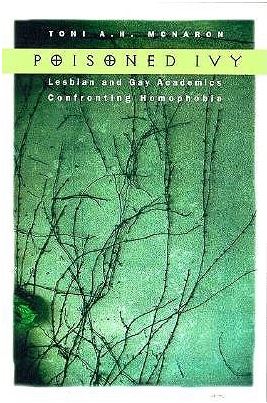 challenge to academic life. A perhaps more familiar work appeared two years later in 1997 authored by Toni McNaron of the University of Minnesota, Poisoned Ivy : Lesbian and Gay Academics Confronting Homophobia. Integrating data gathered through a survey questionnaire completed by 304 faculty from a varied array of colleges and universities, McNaron’s work explores in detail the landscape of being lesbian or gay in American higher education, touching on topics as varied as how identity informed teaching, research and the arc of career development, balancing personal and professional lives, and the different views held of the value and relevance of being “out”. Full texts of the questionnaires used are included in the appendix. The other 1997 work, William G. Tierney’s Academic Outlaws: Queer Theory and Cultural Studies in the Academy, takes as its point of departure the dedications made by academic writers of their works as to their partners. The author states that his aim has been “the reframing of the university … and the invisibility of lesbian and gay academics. .. the manner in which we have constructed gay identity in research has helped frame the way lesbian and gay people get defined in the daily life of the university.” (Tierney 1997: xviii).
challenge to academic life. A perhaps more familiar work appeared two years later in 1997 authored by Toni McNaron of the University of Minnesota, Poisoned Ivy : Lesbian and Gay Academics Confronting Homophobia. Integrating data gathered through a survey questionnaire completed by 304 faculty from a varied array of colleges and universities, McNaron’s work explores in detail the landscape of being lesbian or gay in American higher education, touching on topics as varied as how identity informed teaching, research and the arc of career development, balancing personal and professional lives, and the different views held of the value and relevance of being “out”. Full texts of the questionnaires used are included in the appendix. The other 1997 work, William G. Tierney’s Academic Outlaws: Queer Theory and Cultural Studies in the Academy, takes as its point of departure the dedications made by academic writers of their works as to their partners. The author states that his aim has been “the reframing of the university … and the invisibility of lesbian and gay academics. .. the manner in which we have constructed gay identity in research has helped frame the way lesbian and gay people get defined in the daily life of the university.” (Tierney 1997: xviii).
The concern to make university a safe and expressive place for LGBT students as part of the standard duties of faculty and administrators examined in Beyond Tolerance and in the Oregon, Massachusetts and Michigan State reports was more formally addressed in the 1998 anthology from Greenwood Press – Working with Lesbian, Gay, Bisexual, and Transgender College Students :A Handbook for Faculty and Administrators. Its forty-two papers are divided into eleven sections covering the following topics: identifying and meeting the needs of LGBT students, ways of crafting accepting and welcoming spaces in contexts as diverse as graduate school, alumni, the Greek system, the black community, residence halls, career advising, health issues (which include transitioning and disability as well as HIV prevention), athletics, faculty and classroom issues (among them mentoring LGBT students and planning and bringing into being and LGBT studies class), student organizations, programming and the effective uses of technology. Given the subsequent explosion of LGBT-related websites, homepages and blogs and their use by the community for a wide range of purposes, the papers on “ Technology; A Potential Ally for 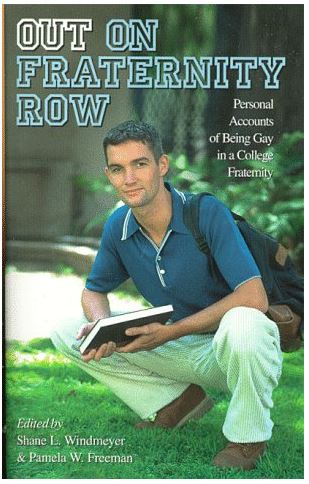 Lesbian, Gay, Bisexual and Transgender Students “ by Aaron F. Lucier and “The Lavender Web: LGBT Resources On the Internet” by David C. Barnett and Ronni L. Sanlo offer useful historical snapshots of where this thread of community development stood at the end of the 1990s. The St. James Press Lesbian and Gay Almanac, also published in 1998, contains a lengthy essay by John Younger covering “Education and Scholarship”, divided into sections on university rights and privileges, academics, campus life and academic production and scholarship, accompanied by profiles of seven prominent individuals. A listing of “Programs in Gender and Lesbian, Gay, Bisexual and Transgender Studies at Universities in the United States and Canada” of the late 1990s provides a useful baseline for later growth of this academic discipline. The coverage of LGBT people in the Greek system was significantly expanded in 1998 by Out On Fraternity Row : Personal Accounts of Being Gay In A College Fraternity edited by Shane L. Windmeyer and Pamela W. Freeman which shares the stories of thirty openly gay men who also chose to affiliate with specific fraternity chapters.
Lesbian, Gay, Bisexual and Transgender Students “ by Aaron F. Lucier and “The Lavender Web: LGBT Resources On the Internet” by David C. Barnett and Ronni L. Sanlo offer useful historical snapshots of where this thread of community development stood at the end of the 1990s. The St. James Press Lesbian and Gay Almanac, also published in 1998, contains a lengthy essay by John Younger covering “Education and Scholarship”, divided into sections on university rights and privileges, academics, campus life and academic production and scholarship, accompanied by profiles of seven prominent individuals. A listing of “Programs in Gender and Lesbian, Gay, Bisexual and Transgender Studies at Universities in the United States and Canada” of the late 1990s provides a useful baseline for later growth of this academic discipline. The coverage of LGBT people in the Greek system was significantly expanded in 1998 by Out On Fraternity Row : Personal Accounts of Being Gay In A College Fraternity edited by Shane L. Windmeyer and Pamela W. Freeman which shares the stories of thirty openly gay men who also chose to affiliate with specific fraternity chapters.
Another genre of personal narratives which while known has been less studied in an LGBT context was also explored in 1998 by William Pugh in his article ”It’s Just My Job To Be ‘Out’: Tenure Stories of Lesbian, Gay, and Bisexual Academics” in the Journal of Gay, Lesbian, and Bisexual Identity. He states that “in this essay, I analyze the stories that gay, lesbian, gay, and bisexual professors tell one another about tenure and promotion from both sociological and folkloric perspectives…to demonstrate how these narratives depict discriminatory practices…I also analyze my materials from the perspective of a folklorist because the stories are transmitted from one academic to another as folklore, most often 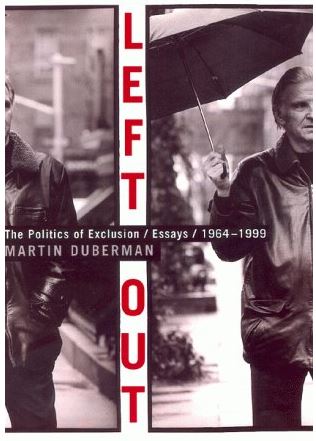 either as personal experience narratives- the stories we tell about ourselves-or as urban legends- the tales, often apocryphal, which are usually described as having been heard from “ a friend of a friend.” (Pugh 1998: 94). The final year of the twentieth century saw the appearance of a work that reflected the spread of LGBT studies across the planet, the anthology Gay, Lesbian and Queer Studies in Australia edited by Raymond Donovan and Leong K. Chan from the Australian Centre for Lesbian and Gay Research at the University of Sydney. Essays in this volume assess the status of the new discipline in Australia, Canada, the United States and England, as well as reviewing lesbian, queer and gay subjects being taught at the universities of Australia. Historian Martin Duberman included an essay on “The Gay Academic Union” in the anthology Left Out: The Politics of Exclusion: Essays, 1964-1999, which would be reprinted in 2002.
either as personal experience narratives- the stories we tell about ourselves-or as urban legends- the tales, often apocryphal, which are usually described as having been heard from “ a friend of a friend.” (Pugh 1998: 94). The final year of the twentieth century saw the appearance of a work that reflected the spread of LGBT studies across the planet, the anthology Gay, Lesbian and Queer Studies in Australia edited by Raymond Donovan and Leong K. Chan from the Australian Centre for Lesbian and Gay Research at the University of Sydney. Essays in this volume assess the status of the new discipline in Australia, Canada, the United States and England, as well as reviewing lesbian, queer and gay subjects being taught at the universities of Australia. Historian Martin Duberman included an essay on “The Gay Academic Union” in the anthology Left Out: The Politics of Exclusion: Essays, 1964-1999, which would be reprinted in 2002.
The new millennium opened with a groundbreaking anthology which filled a distinct gap in the literature of LGBT higher education by balancing the experiences told by faculty and staff with the voices of individual students. Out & About Campus : Personal Accounts By Lesbian, Gay, Bisexual & Transgendered College Students was released, edited by Kim Howard and Annie Stevens published by Alyson Press. The American College Personnel Association revisited and updated its coverage of the issues explored by Beyond Tolerance in 1991 in 2000 with Toward Acceptance: Sexual Orientation Issues 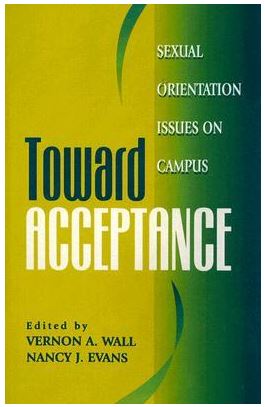 on Campus edited by Vernon A. Wall and Nancy J. Evans, the same team that oversaw the earlier work. The seventeen essays are divided into five sections: research, institutional issues and interventions, interventions in student services, diversity within the LGBT community, and strategies for addressing campus issues. Topics explored range from the state of the student affairs profession as it related to current campus populations and means of promoting awareness of sexual orientation issues to concerns faced by LGBT people at religiously affiliated colleges and universities to the process of becoming an ally, issues for women of color and Latino men, and proactive strategies for student affairs professionals. The list of books, articles, pamphlets, videotapes and media published in Beyond Tolerance has also been updated and offers a useful snapshot of where the literature on LGBT academia stood at the beginning of the twenty-first century.
on Campus edited by Vernon A. Wall and Nancy J. Evans, the same team that oversaw the earlier work. The seventeen essays are divided into five sections: research, institutional issues and interventions, interventions in student services, diversity within the LGBT community, and strategies for addressing campus issues. Topics explored range from the state of the student affairs profession as it related to current campus populations and means of promoting awareness of sexual orientation issues to concerns faced by LGBT people at religiously affiliated colleges and universities to the process of becoming an ally, issues for women of color and Latino men, and proactive strategies for student affairs professionals. The list of books, articles, pamphlets, videotapes and media published in Beyond Tolerance has also been updated and offers a useful snapshot of where the literature on LGBT academia stood at the beginning of the twenty-first century.
The first year of the new millennium witnessed publication of an in-depth historical work by Barry Werth on the 1960 raid on the flat of closeted Smith College literary professor Newton Arvin and the subsequent morals case made against him and two other male members of the Smith faculty. In The 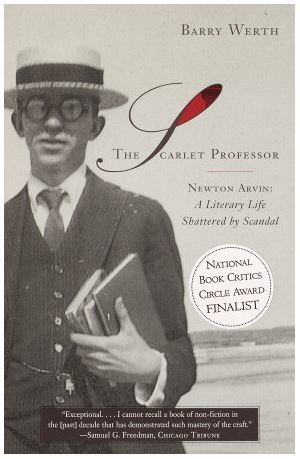 Scarlet Professor: Newton Arvin: A Literary Life Shattered By Scandal, the story of Arvin’s life, career (including his friendship with Truman Capote) and arrest under the provision of Massachusetts’ obscenity law for possession of beefcake photographs and physique magazines is set out with a deft use of primary sources. Perhaps the most chilling aspect of this detailed study is the depiction of the way in which male homosexuality was regarded as an invisible subject within academe nine years before the riots at the Stonewall Inn while being classed as a crime in the mainstream culture. The genre of works begun by Wolf Girls at Vassar in 1993 and continued by Out on Fraternity Row in 1998 continued in the new decade with the anthology Secret Sisters: Stories of Being Lesbian in a College Sorority edited by Pamela W. Freeman.
Scarlet Professor: Newton Arvin: A Literary Life Shattered By Scandal, the story of Arvin’s life, career (including his friendship with Truman Capote) and arrest under the provision of Massachusetts’ obscenity law for possession of beefcake photographs and physique magazines is set out with a deft use of primary sources. Perhaps the most chilling aspect of this detailed study is the depiction of the way in which male homosexuality was regarded as an invisible subject within academe nine years before the riots at the Stonewall Inn while being classed as a crime in the mainstream culture. The genre of works begun by Wolf Girls at Vassar in 1993 and continued by Out on Fraternity Row in 1998 continued in the new decade with the anthology Secret Sisters: Stories of Being Lesbian in a College Sorority edited by Pamela W. Freeman.
In 2002, an anthology of writing centered on the creation and management of LGBT centers or program offices at colleges and universities appeared from Greenwood Press, Our Place on Campus: Lesbian, Gay, Bisexual, Transgender Services and Programs in Higher Education edited by Ronni Sanlo, Sue Rankin, and Robert Schoenberg. The text has a practical emphasis and begins by tracing the emergence of the position of LGBT center or programming office director as a distinct profession within academia, then explores topics ranging from possible administrative models, documenting the campus LGBT population and assessing their needs, strategies for starting a center, safe zone issues and peer counseling, and development requirements such as public relations and fundraising. The final chapter, “Grass-roots Activism versus the Ivory Tower”, addresses a subject not often discussed: how campus activists and faculty relate to and are viewed by LGBT community organizers working elsewhere. The 2002 anthology 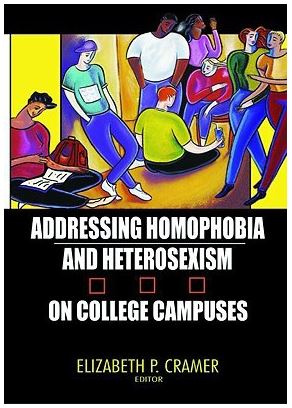 Addressing Homophobia and Heterosexism on College Campuses edited by Elizabeth P. Cramer (originally an issue of the Journal of Lesbian Studies) contains nineteen papers examining campus-wide programs and policies intended to target heterosexism and homophobia (an example being Safe Zone and Ally projects) , attitudinal change and assessment, training for the specific professional fields of social work and mental health, and issues in classroom life and teacher training. The final section provides an annotated list of documentaries and feature films which deal with LGBT issues. The dynamics of coping with an academic environment where differences in sexual orientation and gender identity, although present, were rendered invisible by social reinforcement of heterosexual norms were explored by Silvia Leonor Vilches in her 2002 master’s thesis in sociology at the University of Victoria, Managing Visibility : The Process of Managing Equity Issues for Gay, Lesbian, Bisexual, Two-spirited, and Transgender People in An Academic Environment. Part of the data for this thesis was generated by the author’s participation in a university task force investigating individual campus experiences relating to sexual orientation and transgender identity. And in Australia , Graham Willett contributed a short working paper to the University of Melbourne’s institutional history section entitled From Camp to Gay: The Homosexual History of the University of Melbourne, 1960-1976.
Addressing Homophobia and Heterosexism on College Campuses edited by Elizabeth P. Cramer (originally an issue of the Journal of Lesbian Studies) contains nineteen papers examining campus-wide programs and policies intended to target heterosexism and homophobia (an example being Safe Zone and Ally projects) , attitudinal change and assessment, training for the specific professional fields of social work and mental health, and issues in classroom life and teacher training. The final section provides an annotated list of documentaries and feature films which deal with LGBT issues. The dynamics of coping with an academic environment where differences in sexual orientation and gender identity, although present, were rendered invisible by social reinforcement of heterosexual norms were explored by Silvia Leonor Vilches in her 2002 master’s thesis in sociology at the University of Victoria, Managing Visibility : The Process of Managing Equity Issues for Gay, Lesbian, Bisexual, Two-spirited, and Transgender People in An Academic Environment. Part of the data for this thesis was generated by the author’s participation in a university task force investigating individual campus experiences relating to sexual orientation and transgender identity. And in Australia , Graham Willett contributed a short working paper to the University of Melbourne’s institutional history section entitled From Camp to Gay: The Homosexual History of the University of Melbourne, 1960-1976.
The rest of the first decade of the twenty-first century saw the publication of a body of writings on the LGBT academic experience ranging from chapters in reference works to individual monographs. 2003 was notable for the publication of historian Douglass Shand-Tucci’s The Crimson Letter: Harvard,  Homosexuality, and the Shaping of American Culture, the most in-depth study to date of a specific American university and the ways in which it both affirmed and castigated homosexual behaviors and sensibilities.The Policy Institute of the National Gay and Lesbian Task Force expanded the analysis of questions of importance to LGBT people with its report Campus Climate for Gay, Lesbian, Bisexual and Transgender People : A National Perspective by Susan Rankin. It presents the results of survey of some 1700 faculty, students and staff at fourteen American colleges and universities and offers administrators concerned with improving conditions a group of recommendations. The report is also available at http://www.thetaskforce.org/static_html/downloads/reports/reports/CampusClimate.pdf.
Homosexuality, and the Shaping of American Culture, the most in-depth study to date of a specific American university and the ways in which it both affirmed and castigated homosexual behaviors and sensibilities.The Policy Institute of the National Gay and Lesbian Task Force expanded the analysis of questions of importance to LGBT people with its report Campus Climate for Gay, Lesbian, Bisexual and Transgender People : A National Perspective by Susan Rankin. It presents the results of survey of some 1700 faculty, students and staff at fourteen American colleges and universities and offers administrators concerned with improving conditions a group of recommendations. The report is also available at http://www.thetaskforce.org/static_html/downloads/reports/reports/CampusClimate.pdf.
A somewhat broader study from the United Kingdom also appeared in 2003, Silenced Sexualities in Schools and Universities by Debbie Epstein, Sarah O’Flynn, and David Telford. Taking the entire sequence of levels of education from early childhood through university as their framework, the authors examine how heterosexual norms and standards of conduct and expectation are introduced and supported within the educational environment, interacting with other norms of difference such as disability, race , gender and class. The most relevant chapters for LGBT people in higher education are chapter six , “Post-Compulsory Heterosexuality: Silences and Tensions in Curricula and Pedagogy at University” and chapter seven, “The University Challenge: Transition to University”. The LGBT Encyclopedia of Lesbian, Gay, Bisexual and Transgender History in America, edited by Marc Stein published by Scribners in 2004, contains an article by Patricia Broderick on “Colleges and Universities”. The text notes that “as in society at large, the history 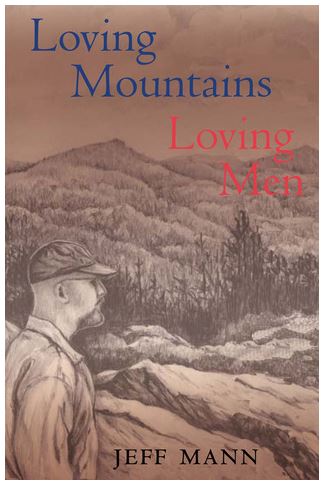 of LGBT people in the academy reflects a legacy of invisibility , discrimination and maltreatment, followed in more recent times by movement towards understanding, acceptance, and full participation” ( Broderick 2004 : 232 ). Factors discussed in the essay include the diversity of academic institutions where LGBT people may attend, the presence of same-sex attractions as an element of institutional histories and personal memoirs, the growth of LGBT studies programs, student issues ranging from housing to athletics and campus activism, alumni groups, and concerns faced by faculty, staff and administrative personnel. In 2005, a distinctive example of a personal account by an out faculty member appeared from Ohio University Press, Loving Mountains, Loving Men by poet and essayist Jeff Mann. His story is one of growing up in Appalachia and finding a path of life that successfully combined and affirmed the strengths of his mountain heritage and his identity as an out gay academic.
of LGBT people in the academy reflects a legacy of invisibility , discrimination and maltreatment, followed in more recent times by movement towards understanding, acceptance, and full participation” ( Broderick 2004 : 232 ). Factors discussed in the essay include the diversity of academic institutions where LGBT people may attend, the presence of same-sex attractions as an element of institutional histories and personal memoirs, the growth of LGBT studies programs, student issues ranging from housing to athletics and campus activism, alumni groups, and concerns faced by faculty, staff and administrative personnel. In 2005, a distinctive example of a personal account by an out faculty member appeared from Ohio University Press, Loving Mountains, Loving Men by poet and essayist Jeff Mann. His story is one of growing up in Appalachia and finding a path of life that successfully combined and affirmed the strengths of his mountain heritage and his identity as an out gay academic.
Another volume in the genre of campus guides for prospective LGBT students appeared in 2006 as a joint project of Alyson Books and The ADVOCATE magazine. The Advocate College Guide for LGBT Students differed from its predecessors by making extensive use of the online environment to gather  data on one hundred American colleges and universities through five thousand interviews with LGBT students and five hundred faculty and staff interviews. Institutions were rated on a broad spectrum of subjects ranging from the presence of LGBT-aware support services, inclusive policies, housing for LGBT students and the existence of LGBT/queer studies courses and certificate programs. The dimensions of social class and socioeconomic background and their influence on the LGBT men and women who choose to become university administrators and faculty, a facet of academic life not often considered, is explored through the thirteen lives and careers presented in the 2008 work Resilience: Queer Professors from the Working Class edited by Kenneth Oldfield and Richard Greggory. And in 2009, the reference work LGBTQ America Today: An Encyclopedia edited by John C. Hawley from Greenwood Press contained an article by Tom Bourdon, “College and University LGBTQ Organizations”.
data on one hundred American colleges and universities through five thousand interviews with LGBT students and five hundred faculty and staff interviews. Institutions were rated on a broad spectrum of subjects ranging from the presence of LGBT-aware support services, inclusive policies, housing for LGBT students and the existence of LGBT/queer studies courses and certificate programs. The dimensions of social class and socioeconomic background and their influence on the LGBT men and women who choose to become university administrators and faculty, a facet of academic life not often considered, is explored through the thirteen lives and careers presented in the 2008 work Resilience: Queer Professors from the Working Class edited by Kenneth Oldfield and Richard Greggory. And in 2009, the reference work LGBTQ America Today: An Encyclopedia edited by John C. Hawley from Greenwood Press contained an article by Tom Bourdon, “College and University LGBTQ Organizations”.
The present decade opened with a uniquely detailed biography illustrating the diverse aspects of the career of Samuel Steward, whose career as a writer and academic involved serving as faculty at institutions in Montana, Washington, and Illinois, becoming a close friend of Gertrude Stein, and later changing careers in the 1950s to work as a tattoo artist and author of paperback pornography under the pseudonym Phil Andros. The detail presented in Justin Spring’s 2010 work Secret Historian : The Life and Times of Samuel Steward, Professor, Tattoo Artist, and Sexual Renegade reflects the author’s use of Steward’s extensive personal diaries and archives. 2011 saw the reissue of Elizabeth Cramer’s 2002 anthology Addressing Homophobia and Heterosexism on College Campuses by Harrington Park Press. Another thoughtful anthology published in 2012 examines the often-hidden dynamics of oppression and discriminatory attitudes and practices within the structure of higher education based on class, gender, race and sexual orientation. Transforming the Ivory Tower: Challenging Racism, Sexism, and Homophobia in the Academy edited by Brent C. Stockdill and Mary Yu Danico contains eight papers, with homophobia the subject of the final essay by Brent Stockdill, “Queering the Ivory Tower: Tales of A Troublemaking Homosexual”. The evolving and diverse question of how to effectively define and implement an academic environment emphasizing inclusion as an institutional practice and value was explored at length in the 2015 anthology Expanding the Circle: Creating an Inclusive Environment in Higher Education for LGBTQ Students and Studies edited by John C. Hawley for SUNY Press. The first group of papers begins by examining the websites of the top twenty-five American public universities to determine their levels of support for their LGBT populations, the status of LGBT studies in the early twenty-first century, and ways of promoting transgender inclusion. This is followed by four case studies representing an unnamed religiously affiliated institution, the University of Rhode Island, Harvard, and a profile of Network VA, an association of LGBTQ staff and faculty in higher education across Virginia. The third section focuses on problems of interpersonal relations for LGBT students within the contexts of service learning, theories of student development, and homophobia, with a brief essay on bullying included as well. The closing five essays cover the ways LGBT issues interact with the equally complex and contentious forces of religion, ethnic identity, and spirituality.
In 2016, one of the earliest academic controversies in post-Stonewall American higher education 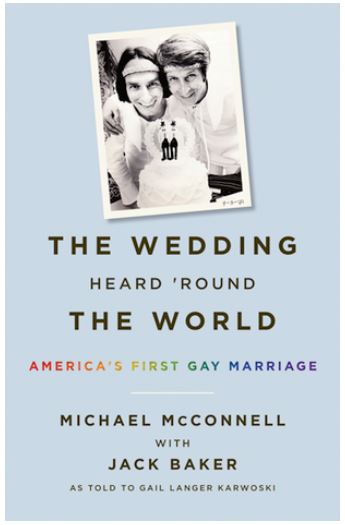 received its long-overdue historical treatment in book form by the men who lived it. In The Wedding Heard ‘Round the World : America’s First Gay Marriage, Michael McConnell and Jack Baker recount the story of how they found a way to be legally wed in 1970 in Hennepin County, Minnesota and the action taken against McConnell by the Board of Regents of the University of Minnesota to rescind an offer of employment as head of the cataloging division at the St. Paul campus. The subsequent (successful) 1971 campaign of Baker to be elected student body president at the same university is also described, as are their years of activism in gay and lesbian rights causes. It is noteworthy that in the summer of 2016, McConnell and Baker spoke at a program about their book and lives at the American Library Association annual conference in Orlando, Florida shortly after the shootings at the Pulse nightclub and received a standing ovation. They were also the first recipients of the American Library Association’s (ALA) Gay, Lesbian, Bisexual and Transgender Round Table (GLBTRT) Award for Political Activism.
received its long-overdue historical treatment in book form by the men who lived it. In The Wedding Heard ‘Round the World : America’s First Gay Marriage, Michael McConnell and Jack Baker recount the story of how they found a way to be legally wed in 1970 in Hennepin County, Minnesota and the action taken against McConnell by the Board of Regents of the University of Minnesota to rescind an offer of employment as head of the cataloging division at the St. Paul campus. The subsequent (successful) 1971 campaign of Baker to be elected student body president at the same university is also described, as are their years of activism in gay and lesbian rights causes. It is noteworthy that in the summer of 2016, McConnell and Baker spoke at a program about their book and lives at the American Library Association annual conference in Orlando, Florida shortly after the shootings at the Pulse nightclub and received a standing ovation. They were also the first recipients of the American Library Association’s (ALA) Gay, Lesbian, Bisexual and Transgender Round Table (GLBTRT) Award for Political Activism.
Research and writing on the academic experience in all its dimensions for students who identify as trans, a topic often submerged in broader discussions of LGBT issues, received a major addition in 2017 with the appearance of Trans* in College: Transgender Students’ Strategies for Navigating Campus Life 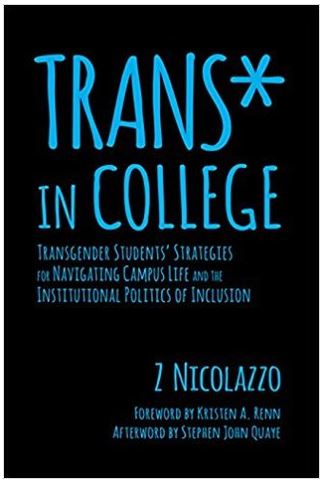 and the Institutional Politics of Inclusion by Z Nicolazzo. The author, a faculty member of the College of Education at Northern Illinois University, addresses the work not only to trans students but to administrators , faculty and student affairs personnel as well. The book begins by sharing the author’s own identity journey, then explores the current body of trans-related research to illustrate the array of possible expressions and representations of trans identity before moving to consider how the structures of higher education reinforce and sustain “the gender-binary discourse”. A vital part of the book are the ethnographic accounts of nine trans collegians whose lives on campus provide direct evidences of the areas where higher education as currently configured needs to change to recognize and affirm the varied richness of its trans citizens and their distinctive insights. Readers are also provided with a glossary of vocabulary and frequently used terminology and a detailed description of the research design, the latter offered as a model for further fieldwork. The distance LGBT people in the world of higher education have traveled since Louis Crew’s initial survey continues to be chronicled in a varied literature of lives and learnings, whose evolution promises to bring new challenges and opportunities for campus engagement and growth.
and the Institutional Politics of Inclusion by Z Nicolazzo. The author, a faculty member of the College of Education at Northern Illinois University, addresses the work not only to trans students but to administrators , faculty and student affairs personnel as well. The book begins by sharing the author’s own identity journey, then explores the current body of trans-related research to illustrate the array of possible expressions and representations of trans identity before moving to consider how the structures of higher education reinforce and sustain “the gender-binary discourse”. A vital part of the book are the ethnographic accounts of nine trans collegians whose lives on campus provide direct evidences of the areas where higher education as currently configured needs to change to recognize and affirm the varied richness of its trans citizens and their distinctive insights. Readers are also provided with a glossary of vocabulary and frequently used terminology and a detailed description of the research design, the latter offered as a model for further fieldwork. The distance LGBT people in the world of higher education have traveled since Louis Crew’s initial survey continues to be chronicled in a varied literature of lives and learnings, whose evolution promises to bring new challenges and opportunities for campus engagement and growth.
References
Addressing Homophobia and Heterosexism on College Campuses edited by Elizabeth P. Cramer. Binghamton, NY : Harrington Park Press, 2002.
Addressing Homophobia and Heterosexism on College Campuses edited by Elizabeth P. Cramer. New York : Routledge, 2011.
The Advocate College Guide for LGBT Students by Shane L.Windmeyer. New York : Alyson Books, 2006.
Albin, Michael Rose. Historical Perspectives on the Midwestern Gay and Lesbian Academic Community : Stonewall and the Ivory Tower. M.A. thesis , Michigan State University, 1995.
Barnett, David C. and Ronni L. Sanlo. The Lavender Web: LGBT Resources On the Internet “ by David C. Barnett and Ronni L. Sanlo “ in Working with Lesbian, Gay, Bisexual, and Transgender College Students : A Handbook for Faculty and Administrators edited by Ronni L. Sanlo. Westport, Conn. : Greenwood Press, 1998 : 403-412.
Beyond Tolerance : Gays, Lesbians, and Bisexuals on Campus edited by Nancy J. Evans and Vernon A. Wall. Alexandria, VA : American College Personnel Association, 1991.
Bourdon, Tom. “College and University LGBTQ Organizations“ in LGBTQ America Today: An Encyclopedia edited by John C. Hawley. Westport, Connecticut: Greenwood, 2009 : 237-238.
Broderick, Patricia M. “College and Universities“ in LGBT Encyclopedia of Lesbian, Gay, Bisexual and Transgender History in America edited by Marc Stein. New York : Scribners, 2004 : 232-237.
Brogan, James E., “Teaching Gay Literature in San Francisco.” In: Louie Crew (ed.), The Gay Academic. Palm Springs, CA: ETC Publications, 1978,: 152-163.
Building A Diverse Faculty edited by Joanne Gainen and Robert Boice. San Francisco, California : Jossey-Bass, 1993.
Creating Safety, Valuing Diversity : Lesbians and Gay Men in the University. University of Oregon.; Task Force on Lesbian and Gay Concerns. Eugene, Oregon : University of Oregon, 1990.
Donovan, Raymond, Leong K Chan and Michael Hurley. Gay, Lesbian and Queer Studies in Australia. Sydney : Australian Centre for Lesbian and Gay Research, University of Sydney, 1999
Duberman, Martin B. “ The Gay Academic Union “ in Left Out : The Politics of Exclusion : Essays, 1964-1999. New York, NY : Basic Books, 1999 : 269-285.
Duberman, Martin B. Left Out : The Politics of Exclusion : Essays, 1964-1999. New York : Basic Books, 1999.
Epstein, Debbie, Sarah O’Flynn and David Telford. Silenced Sexualities in Schools and Universities. Stoke on Trent, UK and Sterling, Virginia : Trentham Books, 2003.
Expanding the Circle : Creating An Inclusive Environment in Higher Education for LGBTQ Students and Studies edited by John C. Hawley. Albany : State University of New York Press, 2015.
The Gay Academic edited by Louie Crew. Palm Springs, California. : ETC Publications, c1978.
Gay Academic Union Journal : Gai Saber. New York, N.Y. : Gay Academic Union, 1977-1978. Quarterly.
Gay Academic Union Newsletter. Los Angeles, California : Gay Academic Union, 1978-
Gay and Lesbian Studies edited by Henry L. Minton. New York : Haworth Press, 1992.
“ Gay Scholars Form Union. ” The ADVOCATE vol.115 ( July 4, 1973 ) : 19
Gittings, Barbara. “Combatting the Lies in the Libraries.” In: Louie Crew (ed.), The Gay Academic. Palm Springs, CA: ETC Publications, 1978,: 107-118.
“ Homosexuality Isn’t Valid Reason To Deny Job, Court Tells University. ” The ADVOCATE v.4, n.16 ( September 30-October 13, 1970 ) : 1.
In Every Classroom : the report of the President’s Select Committee for Lesbian and Gay Concerns ; James D. Anderson, Chairperson ; Ronald A. Nieberding, editor. New Brunswick, N.J. : Office of Student Life Policy and Services, the State University of New Jersey, Rutgers, 1989.
Lucier, Aaron F. “ Technology; A Potential Ally for Lesbian, Gay, Bisexual and Transgender Students “ by Aaron F. Lucier in Working with Lesbian, Gay, Bisexual, and Transgender College Students : A Handbook for Faculty and Administrators edited by Ronni L. Sanlo. Westport, Conn. : Greenwood Press, 1998: 395-402.
McConnell, Michael and Jack Baker. The Wedding Heard ‘Round The World : America’s First Gay Marriage. Minneapolis : University of Minnesota Press, 2016.
McNaron. Toni A.H. Poisoned Ivy : Lesbian and Gay Academics Confronting Homophobia. Philadelphia : Temple University Press, 1997.
Making Colleges and Universities Safe for Gay and Lesbian Students : Report and Recommendations of the Governor’s Commission on Gay and Lesbian Youth. Boston, Massachusetts : Governor’s Commission on Gay and Lesbian Youth, 1993.
Mann, Jeff. Loving Mountains, Loving Men. Athens, Ohio : Ohio University Press, 2005.
Moving Forward : Lesbians and Gay Men at Michigan State University. Michigan State University.; University-Wide Task Force on Lesbian & Gay Issues. East Lansing, Mich. : Michigan State University, 1992.
Nicolazzo, Z.. Trans* In College : Transgender Students’ Strategies For Navigating Campus Life and the Institutional Politics of Inclusion. Sterling, Virginia : Stylus Publishing, LLC, 2017.
Our Place On Campus :Lesbian, Gay, Bisexual, Transgender Services and Programs in Higher Education edited by Ronni Sanlo, Sue Rankin, and Robert Schoenberg. Westport, Connecticut : Greenwood Press, 2002.
Out & About Campus : Personal Accounts By Lesbian, Gay, Bisexual & Transgendered College Students edited by Kim Howard and Annie Stevens. Los Angeles : Alyson Books, 2000.
Out On Fraternity Row : Personal Accounts of Being Gay In A College Fraternity edited by Shane L. Windmeyer and Pamela W. Freeman. Los Angeles : Alyson Books, 1998.
Pugh, William White. ”It’s Just My Job To Be ‘Out'”: Tenure Stories of Lesbian, Gay, and Bisexual Academics “. Journal of Gay, Lesbian, and Bisexual Identity 3.2 (April 1998): 93-112.
Rankin, Susan R. Campus Climate for Gay, Lesbian, Bisexual and Transgender People : A National Perspective. Washington, DC : National Gay and Lesbian Task Force Policy Institute, 2003.
Resilience : Queer Professors From the Working Class edited by Kenneth Oldfield and Richard Greggory Johnson III. Albany : State University of New York Press, 2008.
Secret Sisters : Stories of Being Lesbian in A College Sorority edited by Shane L. Windmeyer and Pamela W. Freeman. Los Angeles, California : Alyson ; London : Turnaround, 2001.
Shand-Tucci, Douglass. The Crimson Letter : Harvard, Homosexuality, and the Shaping of American Culture. New York: St. Martin’s Press,2003.
Sherrill , Jan-Mitchell and Craig A. Hardesty. The Gay, Lesbian, and Bisexual Students’ Guide to Colleges, Universities, and Graduate Schools. New York : New York University Press, 1994.
Spring, Justin. Secret Historian : The Life and Times of Samuel Steward, Professor, Tattoo Artist, and Sexual Renegade. New York : Farrar, Straus and Giroux, 2010.
Stockdill, Brent C. “ Queering the Ivory Tower: Tales of A Troublemaking Homosexual” in Transforming the Ivory Tower : Challenging Racism, Sexism, and Homophobia in the Academy edited by Brent C. Stockdill and Mary Yu Danico. Honolulu : University of Hawai`i Press in association with UCLA Asian American Studies Center, 2012 : 145-182.
Tierney, William G. and Robert A. Rhoads. “ Enhancing academic communities for lesbian, gay and bisexual faculty” in Building A Diverse Faculty edited by Joanne Gainen and Robert Boice. San Francisco, CA : Jossey-Bass, 1993. : 43-50.
Tierney, William G. Academic Outlaws : Queer Theory and Cultural Studies in the Academy. Thousand Oaks, Calif.ornia : Sage Publications, 1997.
Tilting The Tower : Lesbians, Teaching, Queer Subjects edited by Linda Garber. New York : Routledge, 1994.
Toward Acceptance : Sexual Orientation Issues On Campus edited by Vernon A. Wall and Nancy J. Evans. Lanham, Md. : University Press of America ; 2000.
Transforming the Ivory Tower : Challenging Racism, Sexism, and Homophobia in the Academy edited by Brent C. Stockdill and Mary Yu Danico. Honolulu : University of Hawai`i Press in association with UCLA Asian American Studies Center, 2012
The Universities and the Gay Experience : Proceedings of the Conference. New York : Gay Academic Union, 1974.
Vilches, Silvia Leonor. Managing Visibility : The Process of Managing Equity Issues for Gay, Lesbian, Bisexual, Two-spirited, and Transgender People In An Academic Environment. M.A. dissertation, University of Victoria; 2002
Werth, Barry. The Scarlet Professor : Newton Arvin : A Literary Life Shattered By Scandal. New York : Nan A. Talese, 2001.
Willett, Graham. From Camp to Gay : The Homosexual History of the University of Melbourne, 1960-1976. Melbourne : History of the University Unit, University of Melbourne, 2002.
Wolf Girls at Vassar : Lesbian & Gay Experiences, 1930-1990 edited by Anne Macaky. New York : St. Martin’s Press, 1993.
Working With Lesbian, Gay, Bisexual, and Transgender College Students : A Handbook for Faculty and Administrators edited by Ronni L. Sanlo. Westport, Connecticut : Greenwood Press, 1998.
Younger, John G. “ Education and Scholarship “ in St. James Press Gay & Lesbian Almanac edited by Neil Schlager. Detroit: St. James Press, 1998. : 205-231.
Copyright R. Ridinger 2017
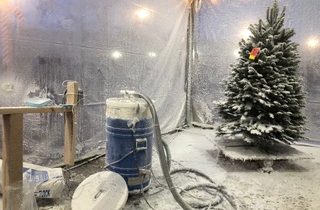
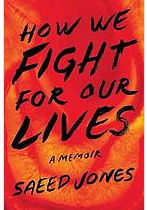
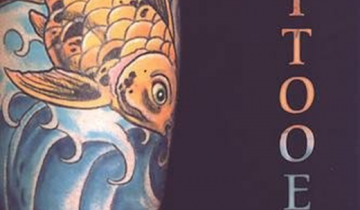
… [Trackback]
[…] Read More: glbtrt.ala.org/reviews/off-the-shelf-21-inside-the-lavender-tower-lgbt-people-in-academe/ […]